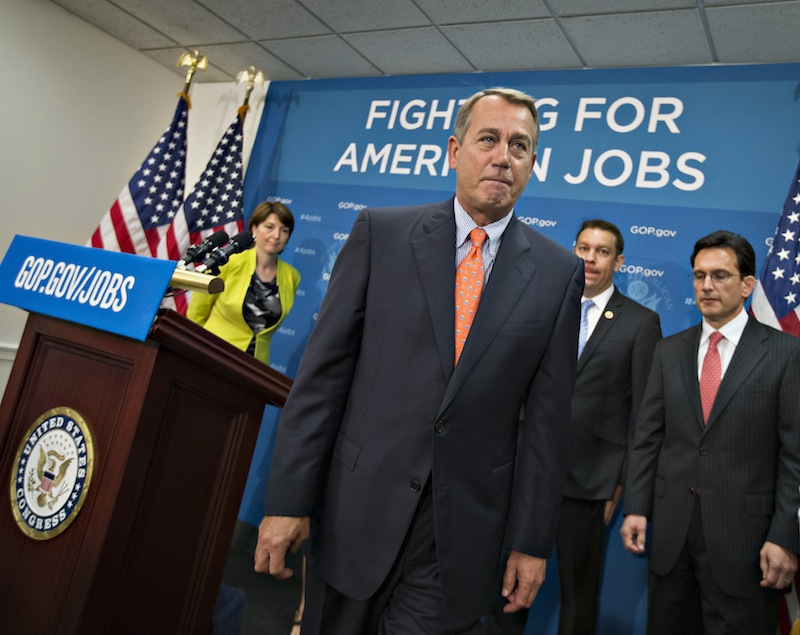Let’s face it. Republicans are unlikely to defund Obamacare in a continuing resolution to keep the federal government open when the fiscal year ends Sept. 30. They’re even less likely to succeed in delaying the implementation of Obamacare for a full year in return for not sending the U.S. government into default on its debt when the debt limit is reached in mid-October.
But what is becoming increasingly clear is that conservatives’ headlong pursuit of their Obamacare whale is jeopardizing the GOP’s ability to secure their own arguably achievable spending goals.
For all the noise about the health care law, the real fight is about how much the government spends when the new fiscal year begins on Oct. 1. The stopgap measure House GOP leaders have proposed maintains spending at the current sequestration level of $986 billion until December 15, lower than spending levels previously agreed to by both parties.
“Enactment of a CR at sequester levels would contain $64 billion in less spending compared to the current funding levels President Obama signed into law a mere five months ago,” Majority Leader Eric Cantor (R-VA) wrote in a recent memo to Republicans. “In signing a CR at sequester levels, the President would be endorsing a level of spending that wipes away all the increases he and Congressional Democrats made while they were in charge.”
But it’s not clear Republicans can pass that bill. They already delayed it amid a mutiny from conservatives demanding they defund Obamacare or shut down the government. Speaker John Boehner (R-OH) said Thursday that many options are being considered on what to do next.
If House Republicans succeed in passing a CR (that doesn’t contain an Obamacare poison pill), Senate Democratic aides privately admit they’ll have to swallow it — even if it bakes in the sequestration cuts. They won’t threaten a government shutdown in order to raise spending — for that reason, leaders haven’t drawn any red lines on what level to establish. Once the stopgap measure passes they’ll keep trying to exploit GOP divisions and seek a budget agreement to replace sequestration. But then Democrats will be negotiating from what will essentially be a new, lower spending baseline.
On the other hand, if House Republicans fail to get the votes for a CR, they’ll have to enlist Democrats, who are salivating at the prospect that Republican infighting will stymie the GOP’s achievable spending goals.
“They’re a complete mess. They can’t pass anything at this point,” said a House Democratic aide. “It’s hard to see how they take a step forward without relying on significant Democratic votes.”
Publicly, Democrats are tight-lipped about what they’ll ask for in that scenario.
“Let’s find out what they can do,” Senate Majority Leader Harry Reid (D-NV) told reporters in the Capitol. “It’s hard to negotiate on something that doesn’t exist.”
“We will deal with whatever they send us,” he said.
TPM asked Sen. Chuck Schumer (D-NY) what spending level Democrats will push for.
“We’re not going to negotiate numbers,” he said Thursday. “But remember, we’re on pretty strong ground. The next year of sequestration has $22 billion of defense cuts and actually a $1 billion increase in non-defense.”
Ultimately, House Republicans can call the shots on a continuing resolution if they’re able to unite their conference. Boehner is highly motivated to make that happen in order to protect the sequester — perhaps his most significant achievement as Speaker. If he fails, he would be forced to hand the initiative to Democrats.
Democrats’ ideal scenario is to do what the Senate-passed budget calls for and establish a spending level of $1.058 trillion, while replacing sequestration with a balanced mix of targeted spending cuts and new tax revenues wrung from closing loopholes. But that’s unlikely to happen without a budget deal, for which negotiations have collapsed.
A wildcard scenario that might work in Democrats’ favor goes like this: the government shuts down, the public blames Republicans as it did in the 1990s, and GOP lawmakers face pressure to cut a deal to replace sequestration because Democrats hold the cards. But that’s less likely to happen as all congressional leaders want to avoid a shutdown.






